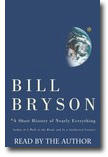Book Review
 A Short History of Nearly Everything
A Short History of Nearly EverythingAuthor and Narrator: Bill Bryson
Review from audio CD version
A catchy title for an intriguing book about the core concepts in science - space, atoms, evolution, biology, geology, and more. While not the exhaustive resource one might assume from its catchy title, the book has just the right balance of scientific rigor, balanced with a tongue-in-cheek style and good writing to make it an intriguing work.
The book gets started by drawing with words a picture for us of just how expansive our universe is. The shear scope of our universe - our own little solar system, for that matter - is explained in a manner no science book or lecture had ever before. It leaves one with an unshakeable "wow" factor.
In reverse, Bryson spends considerable time drawing readers/listeners into the atomic structure at such minuete levels that the reader is relieved to hear him confess that this is simply unimaginable to any human. One is so utterly taken by the tremendous complexities, inter-woven elements, and sheer scope in the large and small that I kept asking myself "how can this have become reality by chance, without a designer." Still, one is left with a healthy respect for science, research, and the great desire for knowledge.
The author deftly avoids an evolution vs. creation debate, sprinkling more than a few off hand remarks that "intelligent design" advocates will find comfort in. However, this is all discussed in terms of scientific study and the evolutionary theory, but with a recognition that science is fallable . . . but fascinating and important.
Bryson's piece is one of highs and lows in interest level, dipping into boredom at times as he recounts the histories of various discoveries, the scientists involved, etc. At these points, I found myself begging for a "tell me what we know now" moment, instead of telling me what the various historical figures from science thought (usually incorrectly). But he always brings you back to an interesting point.
This is a good read (or "listen" in my case) for anyone interested in science. You'll find it most interesting if you accept from the very beginning that, even today, we still really don't even know what we don't know about the universe, the atom, or our own beginnings as humans.



0 Comments:
Post a Comment
<< Home